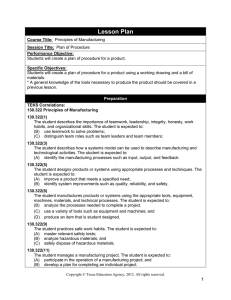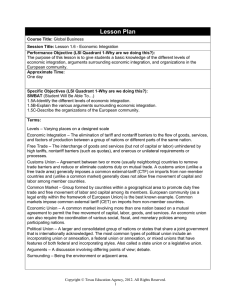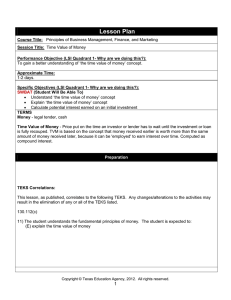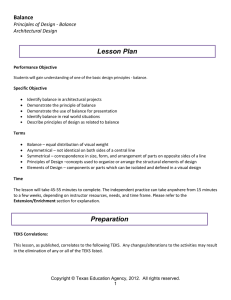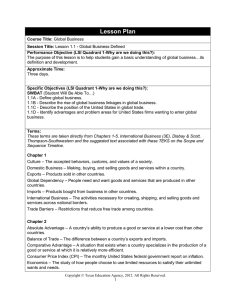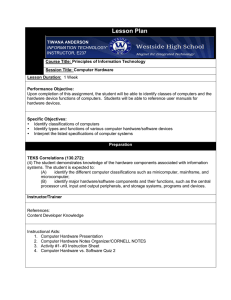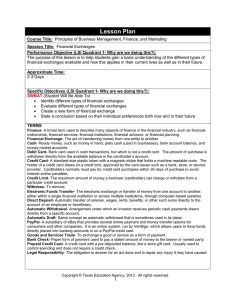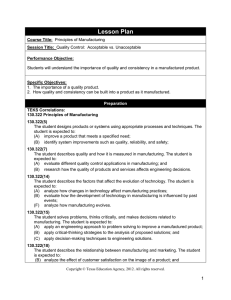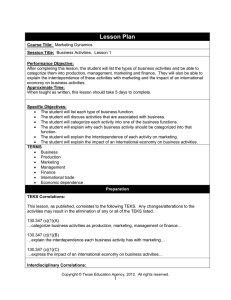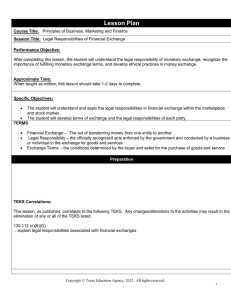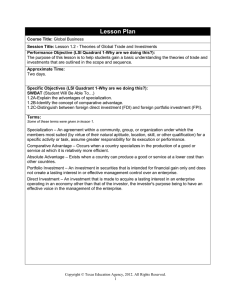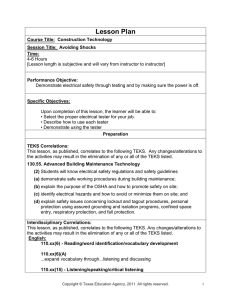Lesson Plan
advertisement
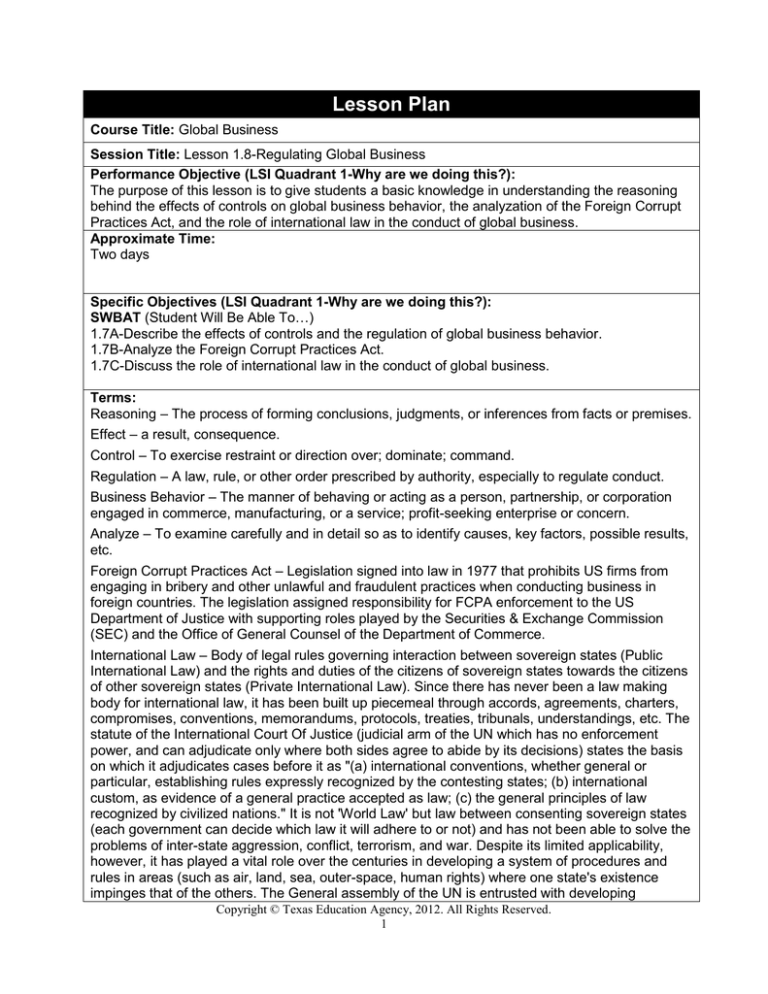
Lesson Plan Course Title: Global Business Session Title: Lesson 1.8-Regulating Global Business Performance Objective (LSI Quadrant 1-Why are we doing this?): The purpose of this lesson is to give students a basic knowledge in understanding the reasoning behind the effects of controls on global business behavior, the analyzation of the Foreign Corrupt Practices Act, and the role of international law in the conduct of global business. Approximate Time: Two days Specific Objectives (LSI Quadrant 1-Why are we doing this?): SWBAT (Student Will Be Able To…) 1.7A-Describe the effects of controls and the regulation of global business behavior. 1.7B-Analyze the Foreign Corrupt Practices Act. 1.7C-Discuss the role of international law in the conduct of global business. Terms: Reasoning – The process of forming conclusions, judgments, or inferences from facts or premises. Effect – a result, consequence. Control – To exercise restraint or direction over; dominate; command. Regulation – A law, rule, or other order prescribed by authority, especially to regulate conduct. Business Behavior – The manner of behaving or acting as a person, partnership, or corporation engaged in commerce, manufacturing, or a service; profit-seeking enterprise or concern. Analyze – To examine carefully and in detail so as to identify causes, key factors, possible results, etc. Foreign Corrupt Practices Act – Legislation signed into law in 1977 that prohibits US firms from engaging in bribery and other unlawful and fraudulent practices when conducting business in foreign countries. The legislation assigned responsibility for FCPA enforcement to the US Department of Justice with supporting roles played by the Securities & Exchange Commission (SEC) and the Office of General Counsel of the Department of Commerce. International Law – Body of legal rules governing interaction between sovereign states (Public International Law) and the rights and duties of the citizens of sovereign states towards the citizens of other sovereign states (Private International Law). Since there has never been a law making body for international law, it has been built up piecemeal through accords, agreements, charters, compromises, conventions, memorandums, protocols, treaties, tribunals, understandings, etc. The statute of the International Court Of Justice (judicial arm of the UN which has no enforcement power, and can adjudicate only where both sides agree to abide by its decisions) states the basis on which it adjudicates cases before it as "(a) international conventions, whether general or particular, establishing rules expressly recognized by the contesting states; (b) international custom, as evidence of a general practice accepted as law; (c) the general principles of law recognized by civilized nations." It is not 'World Law' but law between consenting sovereign states (each government can decide which law it will adhere to or not) and has not been able to solve the problems of inter-state aggression, conflict, terrorism, and war. Despite its limited applicability, however, it has played a vital role over the centuries in developing a system of procedures and rules in areas (such as air, land, sea, outer-space, human rights) where one state's existence impinges that of the others. The General assembly of the UN is entrusted with developing Copyright © Texas Education Agency, 2012. All Rights Reserved. 1 international law. Also called law of nations. Conduct – Personal behavior; way of acting; bearing or deportment. Preparation TEKS Correlations: This lesson, as published, correlates to the following TEKS. Any changes/alterations to the activities may result in the elimination of any or all of the TEKS listed. 1.7 The student analyzes the implications of policies and laws that control and regulate global business. 1.7A-Describe the effects of controls and the regulation of global business behavior. 1.7B-Analyze the Foreign Corrupt Practices Act. 1.7C-Discuss the role of international law in the conduct of global business. Interdisciplinary Correlations: English-English 1 110.31(b)(1). Reading/Vocabulary Development. Students understand new vocabulary and use it when reading and writing. 110.31(b)(11). Reading/Comprehension of informational text/procedural texts. Students understand how to glean and use information in procedural texts and documents. Occupational Correlation (O*Net – www.onetonline.org/): Job Title: Regulatory Affairs Manager O*Net Number: 11-9199.01 Reported Job Titles: None at this time. Tasks: Provide regulatory guidance to departments or development project teams regarding design, development, evaluation, or marketing of products, formulate or implement regulatory affairs policies and procedures to ensure that regulatory compliance is maintained or enhanced, and maintain current knowledge of relevant regulations, including proposed and final rules. Soft Skills: Active listening, complex problem solving, and reading comprehension. Teacher Preparation: The teacher will review the terms in the outline, presentation slides, and any provided materials to become familiar with the lesson. Teacher should locate and evaluate various resources and websites before the lesson. Teacher will have assignments and website information ready to distribute to students. Copyright © Texas Education Agency, 2012. All Rights Reserved. 2 References: www.dictionary.com www.businessdictionary.com http://archive.sba.gov/aboutsba/index.html http://www.sba.gov/about-offices-content/1/2889 http://www.cit.uscourts.gov/index.html Instructional Aids: Lesson 1.8 Presentation-Regulating Global Business Access to Internet Access to businessdictionary.com and dictionary.com Websites listed in presentation Venn Diagram Printable (.jpg) SBA Organization Chart (.pdf) Materials Needed: Lesson 1.8 Presentation-Regulating Global Business Lesson 1.8-Formal Assessment Lesson 1.8-Formal Assessment Key Equipment/Software Needed: Projection unit Instructor computer Internet access Electronic system for taking notes Learner Preparation: Purpose of Assignment and Need to Know Terms - Snapshots of slides below: Introduction Introduction (LSI Quadrant I-Why are we doing this lesson?): ASK: Do you think you need rules and regulations? ASK: Do you think other people need rules and regulations? ASK: Why are rules/regulations established? SAY: We’re going to learn over the next couple of days about the reasons for rules and regulations in global business, about the Foreign Corrupt Practices Act, and take some time to discuss the role of international laws on global business. Copyright © Texas Education Agency, 2012. All Rights Reserved. 3 Outline Outline (LSI Quadrant II-What are we doing in this lesson?): Instructors can use the presentation program/software, slides, handouts, and notes pages in conjunction with the following outline. MI Outline I. Introduction (Day 1) A. Lesson Objectives B. Need to Know Terms. (See provided presentation for details.) C. Discovery Activity Notes to Instructor Slides 2-3 in presentation. II. Discussion (Day 1) – The Reasoning Behind the Effects of Controls and the Control of Global Business Behavior Slide 4 in presentation. III. Discussion (Day 1) – Foreign Corrupt Practices Act A. Cover information B. Introduce activity Slides 5-6 in presentation. IV. Activity (Day 2) – Foreign Corrupt Practices Act Venn Diagram Slides 7 and 8 in presentation and printable copy provided in supplemental materials. V. Instruction/Discussion (Day 2) – International Law and Global Business Slide 9 in presentation. Copyright © Texas Education Agency, 2012. All Rights Reserved. 4 Verbal Linguistic VI. Review Slide 10 in presentation. VII. Extensions Slide 11 in presentation. VIII. Formal Assessment Use provided assessment documents. Logical Mathematical Visual Spatial Musical Rhythmic Bodily Kinesthetic Intrapersonal Interpersonal Naturalist Existentialist Application Introduction-(LSI Quadrant III-How are we going to do this?): Purpose of Assignment and Need to Know, and Discovery - Snapshots copied and pasted below: Copyright © Texas Education Agency, 2012. All Rights Reserved. 5 Instruction/Discussion (LSI Quadrant III-How are we going to do this?): Instruction/Discussion and Activity - Slide snapshots copied and pasted below: Summary Review (LSI Quadrants I-Why are we doing this lesson? and IV-Extending the lesson): Purpose of Assignment, Review, and Extensions - Slide snapshots copied and pasted below: Evaluation Informal Assessment (LSI Quadrant III): Check one or all of the following: • Need to Know Terms • Case Study Research items • Notes taken during class lecture/discussion Extension Extension/Enrichment (LSI Quadrant IV-Extending the lesson): Extensions - Slide copied and pasted below: Copyright © Texas Education Agency, 2012. All Rights Reserved. 6 Formal Assessment (LSI Quadrant III-How are we doing this?) Lesson 1.8 Formal Assessment (provided) Lesson 1.8 Formal Assessment Key (provided) Copyright © Texas Education Agency, 2012. All Rights Reserved. 7 Lesson 8 - Regulating Global Business Formal Assessment Objective: To determine your level of understanding of the reasoning behind controls and regulations of global business behavior, the Foreign Corrupt Practices Act, and the role of international law in the conduct of global business. Please answer the following questions (be specific and detailed). 1. What do you think are the reasons for controlling global business behavior? 2. What conclusions can you draw about the FCPA? 3. What is the purpose of the Small Business Administration –Office of International Trade? What is the purpose of the United States Court of International Trade? 4. Define the term business behavior. Each of the first three questions will be worth 30 points and the fourth question will be worth 10 points. Copyright © Texas Education Agency, 2012. All Rights Reserved. 8 Lesson 8 - Regulating Global Business Formal Assessment Objective: To determine your level of understanding of the reasoning behind controls and regulations of global business behavior, the Foreign Corrupt Practices Act, and the role of international law in the conduct of global business. Please answer the following questions (be specific and detailed). 5. What do you think are the reasons for controlling global business behavior? Answers will vary and need to be supported with information from lesson. 6. What conclusions can you draw about the FCPA? Answers will vary and need to be supported with information from lesson. 7. What is the purpose of the Small Business Administration –Office of International Trade? What is the purpose of the United States Court of International Trade? a. Office of International Trade - The Office of International Trade's mission is to enhance the ability of small businesses to compete in the global marketplace. b. United States Court of International Trade - The United States Court of International Trade, established under Article III of the Constitution, has nationwide jurisdiction over civil actions arising out of the customs and international trade laws of the United States. 8. Define the term business behavior. The manner of behaving or acting as a person, partnership, or corporation engaged in commerce, manufacturing, or a service; profit-seeking enterprise or concern. Each of the first three questions will be worth 30 points and the fourth question will be worth 10 points. Copyright © Texas Education Agency, 2012. All Rights Reserved. 9
